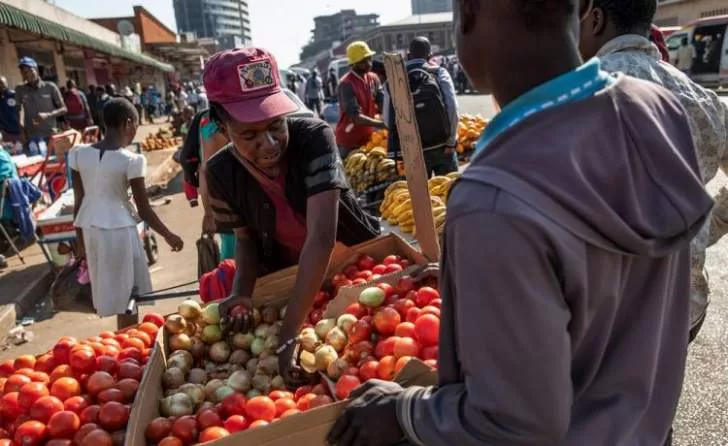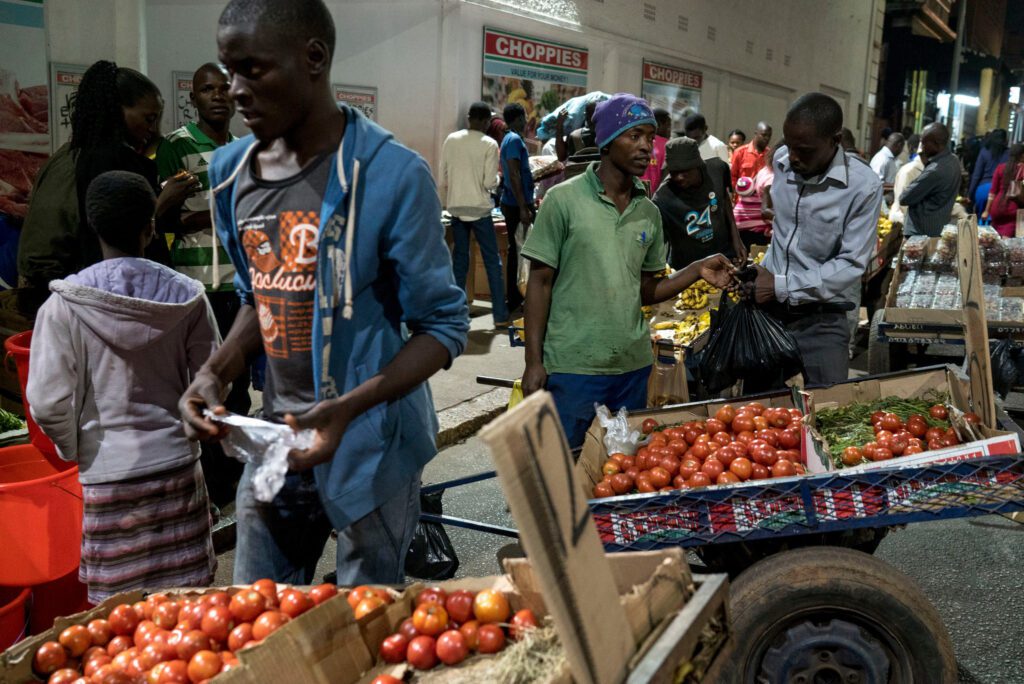Unfazed by Crisis, Bulawayo Vendor Ndlovu Powered Through Pandemic to Support Her Family
“My health is not a worry to me, but what to eat when I get home, that’s the real concern,” said Thembi Ndlovu as she sets her green vegetables and sits with no shed or umbrella.
At 61 years old, Thembi Ndlovu has spent nearly her entire life as a vendor in the bustling streets of Bulawayo’s central business district. From a young age, she learned the ins and outs of the informal economy, honing her skills and building a resilient spirit that has carried her through decades of economic turbulence, including the devastating impact of the COVID-19 pandemic.

Ndlovu’s journey into vending began at the tender age of 10, when she would accompany her mother to the city centre to sell various goods.
“My mother was a vendor, and from a very young age, I would help her with her business,” Ndlovu recalled, her eyes filled with a mixture of nostalgia and determination.
The informal sector has long been a crucial part of Zimbabwe’s economy, providing a lifeline for millions of people who struggle to find employment in the formal job market. According to a recent report by the International Labor Organization, the informal economy accounts for over 60 percent of the country’s total employment, with the majority of workers being women.

For Ndlovu, vending has not only been a means of survival but also a source of pride and independence.
“I’ve been doing this for as long as I can remember. It’s the only way I know how to make a living and provide for my family,” she said
However, the COVID-19 pandemic has dealt a devastating blow to Ndlovu’s livelihood. When the government imposed strict lockdowns to curb the spread of the virus, Ndlovu was forced to close her stall for months, leaving her without any income.
“It was the hardest time of my life,” Ndlovu said, her voice laced with anguish.

She added, “I had no way to support my family, and we went days without food. It was a struggle to survive.”
As the lockdowns eased and Ndlovu was able to return to her stall, she found that the economic landscape had changed drastically.
“There are fewer people on the streets, and those who are here have less money to spend,” she said. “It’s been a constant battle to make ends meet.”
Her stall, located in the heart of the city, is a testament to her resilience and adaptability, even in the face of the pandemic’s challenges.

“The economy has been tough, but I’ve learned to adjust,” Ndlovu said, her voice laced with a hint of weariness.
She proceeded, “When times are hard, I find new ways to make ends meet, whether it’s selling different products or finding new spots to set up my stall.”
Ndlovu’s commitment to her work is unwavering, even as her body shows the strain of decades spent on her feet.
Despite the challenges, Ndlovu takes pride in her role as the primary breadwinner for her family. Two of her four children, both sons, have followed in her footsteps and work as touts, guiding passengers onto minibuses that shuttle commuters around the city.
“They look up to me, and I’m glad they’re able to make a living, even if it’s not exactly what I had in mind,” Ndlovu said with a wry smile. “As long as they can put food on the table, that’s what matters most.”
The informal sector’s impact on Zimbabwe’s economy cannot be overstated, and the COVID-19 pandemic has only highlighted the precarious nature of the lives of vendors like Ndlovu.
For Ndlovu, the struggles of daily life are a constant companion, but her resilience and determination remain unbroken. As she navigates the crowded streets, her voice rings out, offering her wares to passersby with the practised ease of a veteran vendor.
“This is my life, and I’m proud of it,” Ndlovu said, her eyes shining with a quiet strength. “I may not have much, but I’ve always been able to provide for my family, and that’s what matters most to me.”
As the sun begins to set over, Ndlovu gathers her unsold goods and prepares for the long walk home to Old Magwegwe, a high-density suburb in Bulawayo. It’s a journey she’s made countless times, her weary feet carrying her back to the small, modest home where she will once again face the challenge of putting food on the table.
But for Thembi Ndlovu, this is more than just a daily routine, it’s a lifelong commitment to her family and her community, a testament to the resilience of the human spirit in the face of adversity, even in the midst of a global pandemic.
#News in Bulawayo #News in Zimbabwe Artist Arts BCC Bulawayo Bulawayo City Council Bulawayo economy Bulawayo industry Bulawayo news Bulawayo Police Bulawayo Water Bulawayo Water Crisis Bulawayo Women entrepreneurship Business Women Cholera Community Culture Currency Drug Abuse Drugs Economy Farmer Farmers Farming Informal Sector Informal Traders Mining MSMEs Music News in Bulawayo News in Zimbabwe Police Police in Bulawayo Vendor Vendors water Water Crisis Water Shortage water supply issue Women entrepreneurship ZESA Zimbabwean economy Zimbabwe news Zimbabwe water crisis ZRP
Join us for all News in Bulawayo and Bulawayo News in Zimbabwe.












